《管理学》第9版 第16章 激励员工
管理学(第九版)知识点归纳
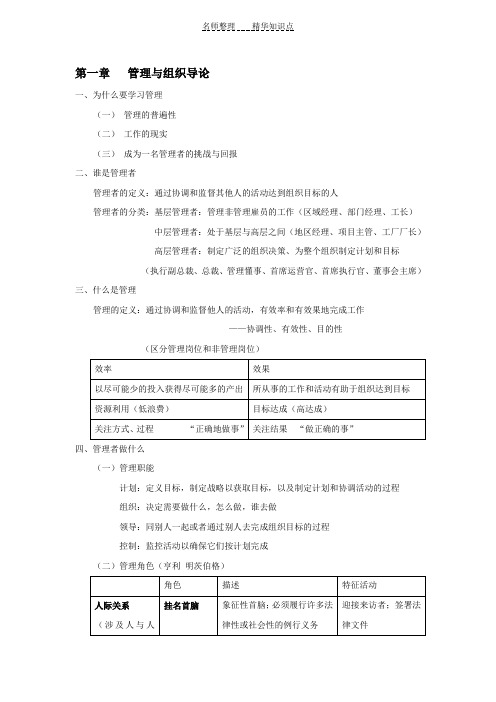
谈判者
在主要的谈判总作为组织的代表
参加与工会的合同谈判
▲管理者角色的强调重点随组织的层次不同而变化
(三)管理技能(罗伯特卡茨)
技术技能:熟练完成特定工作所需的特定领域的知识和技术
人际技能:与单独的个人或群体中的其他成员和睦相处的能力
概念技能:管理者对抽象、复杂情况进行思考和概念化的技能
角色
描述
特征活动
人际关系
(涉及人与人(下级和组织除外)的关系以及其他具有礼仪性和象征性职责的角色)
挂名首脑
象征性首脑;必须履行许多法律性或社会性的例行义务
迎接来访者;签署法律文件
领导者
负责激励下属;承担人员配备、培训以及有关的职责
实际上从事所有的有下级参与的活动
联ቤተ መጻሕፍቲ ባይዱ者
维护自行发展起来的外部关系和消息来源,从中得到帮助和信息
–强文化组织中的雇员对组织的承诺更多一些
–强文化与组织绩效是紧密关联的
–大部分组织已向强文化转变
(三)文化的来源(最初来源通常反映组织创始人的愿景和使命)
(四)如何持续组织文化
员工组织与员工的双向甄选
高层管理者的行为对组织文化的重大影响
组织帮助员工通过社会化过程来适应组织的文化
(五)员工如何学习文化
•如果组织运行不良时,管理者是负有责任的
•管理者是组织的中流砥柱,能够克服任何障碍去实现组织目标
(二)管理象征论
–管理者在组织成败上起到的实际作用极小
–管理者必须对随机性、混淆性和模糊性中的内在含义作出判断
(三)现实是两种观点的综合
–管理者既不是软弱无能的也不是全能的
–组织文化和环境约束着管理者,但管理者有可能改变和影响他们所处的文化和环境,扩展他们自由决定权的范围
管理学课件激励
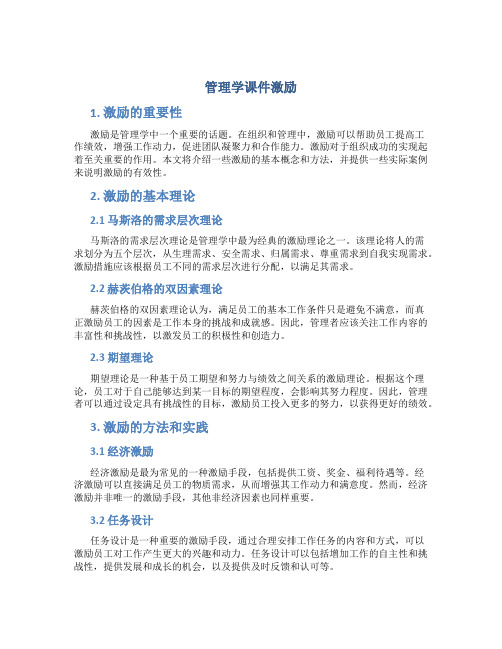
管理学课件激励1. 激励的重要性激励是管理学中一个重要的话题。
在组织和管理中,激励可以帮助员工提高工作绩效,增强工作动力,促进团队凝聚力和合作能力。
激励对于组织成功的实现起着至关重要的作用。
本文将介绍一些激励的基本概念和方法,并提供一些实际案例来说明激励的有效性。
2. 激励的基本理论2.1 马斯洛的需求层次理论马斯洛的需求层次理论是管理学中最为经典的激励理论之一。
该理论将人的需求划分为五个层次,从生理需求、安全需求、归属需求、尊重需求到自我实现需求。
激励措施应该根据员工不同的需求层次进行分配,以满足其需求。
2.2 赫茨伯格的双因素理论赫茨伯格的双因素理论认为,满足员工的基本工作条件只是避免不满意,而真正激励员工的因素是工作本身的挑战和成就感。
因此,管理者应该关注工作内容的丰富性和挑战性,以激发员工的积极性和创造力。
2.3 期望理论期望理论是一种基于员工期望和努力与绩效之间关系的激励理论。
根据这个理论,员工对于自己能够达到某一目标的期望程度,会影响其努力程度。
因此,管理者可以通过设定具有挑战性的目标,激励员工投入更多的努力,以获得更好的绩效。
3. 激励的方法和实践3.1 经济激励经济激励是最为常见的一种激励手段,包括提供工资、奖金、福利待遇等。
经济激励可以直接满足员工的物质需求,从而增强其工作动力和满意度。
然而,经济激励并非唯一的激励手段,其他非经济因素也同样重要。
3.2 任务设计任务设计是一种重要的激励手段,通过合理安排工作任务的内容和方式,可以激励员工对工作产生更大的兴趣和动力。
任务设计可以包括增加工作的自主性和挑战性,提供发展和成长的机会,以及提供及时反馈和认可等。
3.3 培训和发展培训和发展是一种重要的激励手段,通过提供员工所需的培训和发展机会,可以提高员工的技能水平和专业能力。
员工会感到自己的价值得到认可和肯定,从而增强其对工作的投入和动力。
3.4 团队合作和奖励团队合作和奖励是一种能够激励员工的有效手段。
管理学人员激励PPT课件

积极性的表现方式:
► 干劲:是否愿意从事某种工作。
► 责任心:对待工作尽心的程度
► 主动性:职工与监督、分工有关的表现。
► 创造性:与改进工作有关的表现 积极性的一般发展规律是:参与→负责→主动、创新
5
第5页/共70页
二、激励的作用
2.将个人和 企业目标 统一起来
个人目的和组织目的有时一致,有时不一致。
激励的过程模式
第13页/共70页
六、需要的特点
• 需要的多样性 • 需要的层次性 • 需要的潜在性:某些需要不一定被主体所感知、所认识 • 需要的可变性:1.原来迫切的需要已得到某种程度的满足;2.由于外界影响,改变了自己对各种需要得到
满足的迫切性的认识。
14
第14页/共70页
七、从需要到行 1.需为要如何决定了行为?为满足需要人们会采取合理行为
• 合理的行为是指人们在开始行动之前,要有意无意地进行各种比较。包括: • 需要与需要的比较:只有最迫切的需要才会影响行为 • 需要与目标的比较:追求的目标能使主体感觉到能满足迫切需要 • 目标与能力的比较: • 目标与实现目标成本的比较: • 目标与目标的比较:
15
第15页/共70页
七、从需要到行 2.激为励的实质是通过满足个人利益实现组织目标
► 激励即激发人的动机,以产生期望的行为。是一种人的需要和
动机得到强化的心理状态。
► 人的行为都是由于需要而引发。因需要而产生动机,进而引发
行为,需要得到满足,又产生新的需要……周而复始,就是简
单的激励过程。
3
第3页/共70页
激励:是心理学的一个术语。是指管理者 通过某种内部和外部的刺激,激发人的动 机,使人产生一股内在的动力,从而调动 其积极性、主动性和创造性,使其朝向预 定目标前进的一种管理活动。
罗宾斯《管理学》第九版笔记
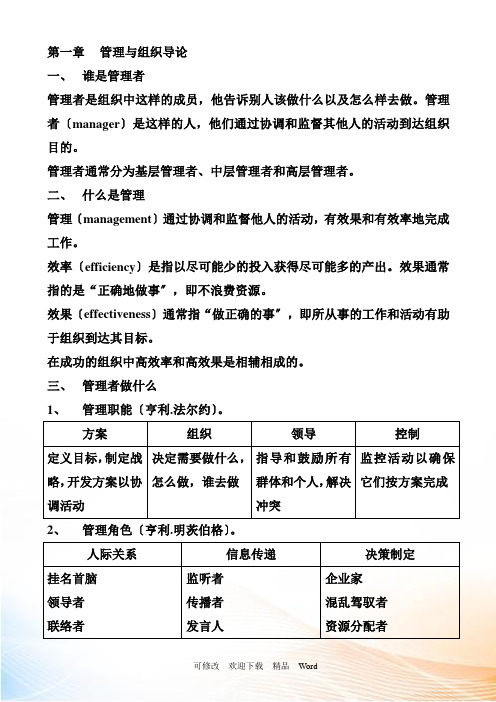
第一章管理与组织导论一、谁是管理者管理者是组织中这样的成员,他告诉别人该做什么以及怎么样去做。
管理者〔manager〕是这样的人,他们通过协调和监督其他人的活动到达组织目的。
管理者通常分为基层管理者、中层管理者和高层管理者。
二、什么是管理管理〔management〕通过协调和监督他人的活动,有效果和有效率地完成工作。
效率〔efficiency〕是指以尽可能少的投入获得尽可能多的产出。
效果通常指的是“正确地做事〞,即不浪费资源。
效果〔effectiveness〕通常指“做正确的事〞,即所从事的工作和活动有助于组织到达其目标。
在成功的组织中高效率和高效果是相辅相成的。
三、管理者做什么1、管理职能〔亨利.法尔约〕。
方案组织领导控制定义目标,制定战略,开发方案以协调活动决定需要做什么,怎么做,谁去做指导和鼓励所有群体和个人,解决冲突监控活动以确保它们按方案完成2、管理角色〔亨利.明茨伯格〕。
人际关系信息传递决策制定挂名首脑领导者联络者监听者传播者发言人企业家混乱驾驭者资源分配者谈判者3、管理技能〔罗伯特.卡茨〕。
技术技能:熟练完成特定工作所需要的特定领域的知识和技术。
人际技能:包括与单独的个人或群体中的其他成员和睦相处的能力。
概念技能:管理者对抽象、复杂情况进行思考和概念化的技能。
四、什么是组织组织〔organization〕是对人员的一种精心安排,以实现某些特定的目的。
组织的三个特征:明确的目的、人员、精细的结构。
现在的组织更倾向于依靠灵活的工作安排、雇员工作团队、开放的沟通系统和供给商联盟。
传统组织新型组织稳定的缺乏灵活性关注职位根据职位定义工作个人导向永久性职位命令导向由管理者作决策规那么导向相对均质的员工队伍工作日从上午8时到下午5时等级关系在上班时间利用组织设施从事工作动态的灵活的关注技能根据任务定义工作团队导向临时性职位参与导向雇员参与决策制定顾客导向多样化的员工队伍工作日长度没有限制横向的和网络化的关系在任何地点、任何时间工作第二章管理的昨天和今天一、管理的历史背景两个重大事件:776,亚当.斯密发表?国富论?主张组织和社会将从劳动分工或工作专业化中获得经济利益。
管理学激励管理优秀课件

什么是激励?
• 激励是指激发和强化员工对自身内在需要的 意识,并推动和鼓励员工为了满足这些需要 而采取的行动,支持和帮助他们为实现目标 而不断努力的过程。
Prentice Hall, 2001
第一节 激励概述
一、需要、动机与行为 心理学家认为,人的行为是由动机决定的,而动机又是
由需要支配的,即行为的起点是需要。
“拉绳实验”
法国工程师林格曼把被试者分 为一人组、二人组、三 人组和八人组,要求各组用尽全力拉绳,同时用灵敏度 很高的测力器分别测量其拉力。结果,二人组的拉力只 是单独拉绳时二人拉力总和的95%;三人组的拉力只是单 独拉绳时三人拉力总和的85%;而八人组的拉力则降到单 独拉绳时八人拉力总和的49%
需要与动机
需 要
Prentice Hall, 2001
心理学认为,需要是有机体 对延续和发展其生命所必需 的客观条件的要求。对于人 来说,需要是由于缺乏某种 生理上的或者心理上的因素 而产生的不平衡,希望得到 补偿的状态。
动机是促使人采取某种行动
动
的内在驱动力,它是引起和
机
维持个体行为,并将此行为 导向满足某种需要的愿望和
理论 理论解释 类型
理论名称
着重研究人 马斯洛需求层
内容 类行为受哪 次理论
型 些因素的影 ERG理论
激励 响,也就是 双因素理论
理论
研究人类的 需要。
成就需要理论
过程 着重研究人 期望理论
型 的行为如何 公平理论
激励 理论
被某些因素 的影响
强化理论 目标设置理论
Prentice Hall, 2001
在你的学习中,是 什么激励你去努力取得优异成绩?
罗宾斯管理学第九版复习资料

管理学复习资料1.管理:通过协调和监督他人的活动,有效率和有效果地完成工作。
2.计划:包括定义组织的目标,制定全局战略以实现目标,以及开发一组广泛的相关计划以整合和协调组织的工作。
3.组织:组织是对人员的一种精心的安排,以实现某些特定的目的。
4.领导:是领导者所做的事情,更具体地说,它是一个影响群体实现目标的过程。
5.控制:控制就是对工作情况进行监督、对比并纠正的过程。
6.目标管理:一个组织成员共同确定组织目标并依据这些目标的达成与否来评估员工绩效的过程。
7.激励员工:激励也是人力资源的重要内容,是指激发人的行为的心理过程。
激励这个概念用于管理,是指激发员工的工作动机,也就是说用各种有效的方法去调动员工的积极性和创造性,使员工努力去完成组织的任务,实现组织的目标。
附区嘉颖对激励员工那一章的理解和总结:管理者在设计具有激励作用的工作时可以遵循什么方法?1、工作扩大化2、工作丰富化3、工作特征模型根据工作特征模型,任何工作都可以用以下五种核心纬度进行描述:1)技能多样性2)任务完整性3)任务重要性4)工作自主性5)工作反馈具体的指导原则:1)合并任务2)形成自然的工作单元3)建立客户关系4)纵向拓展工作5)开通反馈渠道管理者如何有效地激励当前劳动力的特殊群体?管理者必须做的是,了解包括多元化员工、专业人员、应急工以及低能、工资最低的员工在内的这些群体的动机要求。
管理者如何设计恰当的奖励制度?1、账目公开管理2、运用员工认可方案3、运用绩效工资方案4、运用股票期权方案P458当代动机观点包括哪些?(备用参考)三种需要理论、目标设置理论、强化理论、具有激励作用的工作设计、公平理论、期望理论。
8.职务设计:是将职务任务组合起来构成一项完整职务的过程,是对现有职务的认定、修改或产生新的职务。
9.组织文化:组织文化是组织成员共有的价值观、行为准则、传统习惯个做事的方式,它影响了组织成员的行为方式并影响他们如何看待、定义、分析、解决问题。
管理学第16章激励员工

❖ 假设工人没有雄心大志、不喜欢工作、逃避责任以及需要严格 监控
➢ Y理论
❖ 假设工人可以自我指导、主动寻求工作责任、喜欢工作,他们 接受甚至主动寻求工作责任,他们把工作视为一项自然而然的 活动。
➢ 假设: X理论假设较低层级的需要支配着个人行为,Y理 论假设较高层级的需要支配着个人行为。
用
16–3
什么是动机?
• 动机
➢ 动机是人与环境交互作用的结果;它并不是人的特性 ➢ 它是一个人为达到一个目标所付出的努力得到加强、
管理和持续的过程
❖ 强度: 一个强烈程度和驱动力的测量指标 ❖ 方向: 朝向组织目标 ❖ 坚持性: 竭尽全力实现目标.
➢ 但个体的需要组织的目标一致时激励最有效
16–4
• 个体希望通过高水平的努力而实现组织目标的愿 望,其前提条件是这种努力能够满足个体的某些 需要。
• 无论是激励还是动机,都包括三个要素: 努力、组织目标和需要。 一般而言,动机是指诱发、活跃、推 动并引导行为指向一定目标的心理过程。 激励是指影响人们的内在需求或动机, 从而加强、引导和维持行为的活动或过程。
❖ Need of 归属affiliation (nAff) – The desire for interpersonal relationships
16–16
• 成就需要 高成就需要者追求的是个人成就感 高成就需要者未必是一个优秀的管理者,因为高 成就需要者关注自己的成就,优秀管理者应重视 帮助他人实现自己的目标 通过培训可以激发员 工的成就需要
16–5
• 动机过程: 未满足的需要-紧张感-驱力-寻求行为-需要获
得满足-紧张解除。
16–6
早期的动机理论
• 马斯洛的需求层次理论 • 麦格雷戈的X理论和Y理论 • 赫茨伯格的双因素理论
管理学习题16-17章
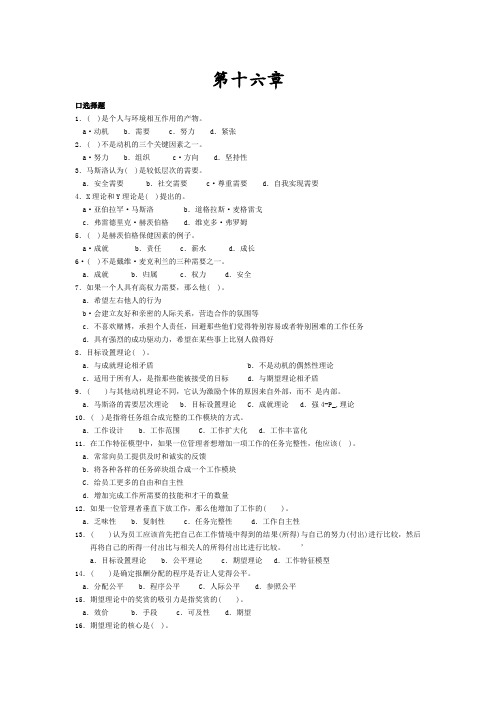
第十六章口选择题1.( )是个人与环境相互作用的产物。
a·动机 b.需要 c.努力 d.紧张2.( )不是动机的三个关键因素之一。
a·努力 b.组织c·方向 d.坚持性3.马斯洛认为( )是较低层次的需要。
a.安全需要 b.社交需要c·尊重需要 d.自我实现需要4.X理论和Y理论是( )提出的。
a·亚伯拉罕·马斯洛 b.道格拉斯·麦格雷戈c.弗雷德里克·赫茨伯格 d.维克多·弗罗姆5.( )是赫茨伯格保健因素的例子。
a·成就 b.责任 c.薪水 d.成长6·( )不是戴维·麦克利兰的三种需要之一。
a.成就 b.归属 c.权力 d.安全7.如果一个人具有高权力需要,那么他( )。
a.希望左右他人的行为b·会建立友好和亲密的人际关系,营造合作的氛围等c.不喜欢赌博,承担个人责任,回避那些他们觉得特别容易或者特别困难的工作任务d.具有强烈的成功驱动力,希望在某些事上比别人做得好8.目标设置理论( )。
a.与成就理论相矛盾 b.不是动机的偶然性理论c.适用于所有人,是指那些能被接受的目标 d.与期望理论相矛盾9.( )与其他动机理论不同,它认为激励个体的原因来自外部,而不是内部。
a.马斯洛的需要层次理论 b.目标设置理论 C.成就理论 d.强4-P_,理论10.( )是指将任务组合成完整的工作模块的方式。
a.工作设计 b.工作范围 C.工作扩大化 d.工作丰富化11.在工作特征模型中,如果一位管理者想增加一项工作的任务完整性,他应该( )。
a.常常向员工提供及时和诚实的反馈b.将各种各样的任务碎块组合成一个工作模块C.给员工更多的自由和自主性d.增加完成工作所需要的技能和才干的数量12.如果一位管理者垂直下放工作,那么他增加了工作的( )。
a.乏味性 b.复制性 c.任务完整性 d.工作自主性13.( )认为员工应该首先把自己在工作情境中得到的结果(所得)与自已的努力(付出)进行比较,然后再将自己的所得一付出比与相关人的所得付出比进行比较。
管理学第16章激励员工
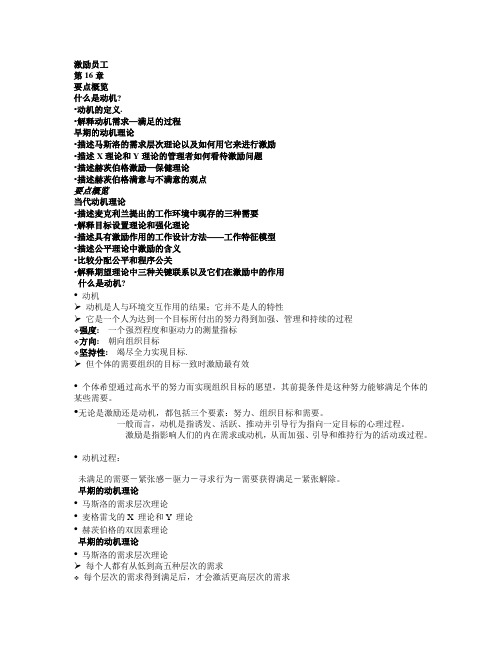
激励员工第16章要点概览什么是动机?•动机的定义.•解释动机需求—满足的过程早期的动机理论•描述马斯洛的需求层次理论以及如何用它来进行激励•描述X理论和Y理论的管理者如何看待激励问题•描述赫茨伯格激励—保健理论•描述赫茨伯格满意与不满意的观点要点概览当代动机理论•描述麦克利兰提出的工作环境中现存的三种需要•解释目标设置理论和强化理论•描述具有激励作用的工作设计方法——工作特征模型•描述公平理论中激励的含义•比较分配公平和程序公关•解释期望理论中三种关键联系以及它们在激励中的作用什么是动机?•动机动机是人与环境交互作用的结果;它并不是人的特性它是一个人为达到一个目标所付出的努力得到加强、管理和持续的过程强度:一个强烈程度和驱动力的测量指标方向:朝向组织目标坚持性:竭尽全力实现目标.但个体的需要组织的目标一致时激励最有效•个体希望通过高水平的努力而实现组织目标的愿望,其前提条件是这种努力能够满足个体的某些需要。
•无论是激励还是动机,都包括三个要素:努力、组织目标和需要。
一般而言,动机是指诱发、活跃、推动并引导行为指向一定目标的心理过程。
激励是指影响人们的内在需求或动机,从而加强、引导和维持行为的活动或过程。
•动机过程:未满足的需要-紧张感-驱力-寻求行为-需要获得满足-紧张解除。
早期的动机理论•马斯洛的需求层次理论•麦格雷戈的X 理论和Y 理论•赫茨伯格的双因素理论早期的动机理论•马斯洛的需求层次理论每个人都有从低到高五种层次的需求每个层次的需求得到满足后,才会激活更高层次的需求得到满足的需求不再具有激励作用对一个人的激励首先要了解他的需求在何种层次上需求的层次性低水平需求( 外部的): 生理需要, 安全高水平需求( 内部的): 社交, 尊重, 自我实现图表16–1 马斯洛的需求层次•个体的需要是逐级上升的,当一种需要得到满足后,就不再具有激励作用了,下一层次就会成为主导需要。
早期的动机理论•麦格雷戈的X 理论和Y 理论X 理论假设工人没有雄心大志、不喜欢工作、逃避责任以及需要严格监控Y 理论假设工人可以自我指导、主动寻求工作责任、喜欢工作,他们接受甚至主动寻求工作责任,他们把工作视为一项自然而然的活动。
管理学第16章激励员工

• 个体希望通过高水平的努力而实现组织目标的愿 望,其前提条件是这种努力能够满足个体的某些 需要。
• 无论是激励还是动机,都包括三个要素: 努力、组织目标和需要。 一般而言,动机是指诱发、活跃、推 动并引导行为指向一定目标的心理过程。 激励是指影响人们的内在需求或动机, 从而加强、引导和维持行为的活动或过程。
管理学第16章激励员工
Motivation and Perception
• 公平Equity Theory
Ø个体总是将自己的付出-所得比与相关 他人的付出-所得比进行比较。如果员 工感觉到自己的比率与他人的比率是等 同的,就觉得自己处在公平的环境里; 如果他们感到自己的报酬过低,则会降 低工作积极性,甚至离职;如果他们感 到自己的报酬过高,则会进一步加强努 力以使报酬公平化。
v 激励因素:成就、认可、工作本身、责任、进步、成长 v 保健因素:监督、公司政策、与主管的关系、工作条件、薪水、
与同伴的关系、个人生活、与下属的关系、地位、稳定与保障
Ø 试图解释为什么工作满意与工作绩效不成正比
v 满意的对立面不是不满意,而是没有满意
管理学第16章激励员工
图表 16–2 赫茨伯格的激励—保健理论
管理学第16章激励员工
Exhibit 16–7 Guidelines for Job Redesign
Source: J.R. Hackman and J.L. Suttle (eds.). Improving Life at Work (Glenview, IL: Scott, Foresman, 1977). With permission of the authors.
• 当预计员工在接受困难任务时会有一定抵触时, 让员工参与目标设置恐怕比直接给员工分派目标 的效果更好。参与目标设置的主要优点可能在于: 它提高了目标的可接受性,使得人们愿意为达到 目标而努力。
《管理学激励》课件

3 对未来发展的展望
激励是推动个体和组织发 展的重要因素,应该得到 足够的重视。
激励应该建立在公平、差 异化和支持的基础上,兼 顾员工பைடு நூலகம்内在和外在需求。
随着社会变革的不断深化, 激励的理论和实践也将不 断发展和创新。
培训激励
通过提供培训和学习 机会,激励员工进一 步提升自己的专业能 力。
激励的效果与问题
1 激励的正向效果
激励可以提高员工的工作动力、创造力和工作满意度。
2 激励的负面效果
激励可能导致员工竞争激烈、压力过大,甚至出现不公正和消极心态。
3 如何有效避免激励的负面影响
建立公平的激励机制、提供支持和反馈,并根据员工的不同需求进行差异化激励。
《管理学激励》PPT课件
在这个《管理学激励》PPT课件中,我们将探讨激励的重要性、现有的激励理 论以及激励的实践。还将分享一些激励的案例,并展望未来的发展。
概述
什么是激励
激励是促使个体或团队行动的力量或动机。
激励的重要性
激励可以提高员工的工作动力、增加创造力,并促进组织的发展和成功。
激励的分类
激励可以分为内在激励和外在激励。
案例分享
案例一:谷歌公司的激励措施
谷歌以丰富的员工福利和创新的工作环境激励员工发挥最佳水平。
案例二:亚马逊公司的激励措施
亚马逊通过奖金和晋升机会激励员工取得优异的工作成绩。
案例三:苹果公司的激励措施
苹果通过培训和发展计划鼓励员工不断学习和提高自己的技能。
总结
1 激励的重要性再强调 2 激励应该如何落实
现有的激励理论
1
心理学理论
- 马斯洛的需求层次理论
- 埃里森的成就动机理论
管理学激励PPT课件

有人做过这样的调查:按时计酬的职工每天 一般只需发挥20%-30%的能力用于工作就足 以保住饭碗。但是如果能充分调动其积极性, 那么他们的潜力会发挥到80%-90%,这之间 的差额用于提高劳动生产率,其效果是可观的。 这需依靠有效的激励!
2
教学目标与要求
➢ 理解激励的概念与激励原理 ➢ 了解激励产生的外因与内因 ➢ 了解需要的意义 ➢ 理解和掌握X理论与Y理论的内容 ➢ 掌握内容型激励理论和过程型激励理论的内容 ➢ 掌握强化理论 ➢ 了解当代激励实务的一般做法
29
保健因素:
这类因素处理的不好会引发 工作不满情绪的产生,处理的好 可预防和消除这种不满。但它不 能起激励作用,只能起到保持人 的积极性,维持工作现状的作用。
激励因素:
促使人因素
避免员工产生不满情绪
工资 监督 地位 安全 工作环境 政策与管理制度 人际关系
3
教学重点与难点
➢激励的概念 ➢激励的原理 ➢X理论与Y理论的内容 ➢需要层次理论 ➢双因素理论 ➢公平理论 ➢期望理论 ➢强化理论
4
事例:
(1)强渡大渡河,飞夺泸定桥。 (2)上甘岭。 (3)中国女排与中国男足。
5
在工作现场,员工们并不一定以同样的进度 和工作主动性开展活动。-----在对工作上的动 机方面,员工之间是存在有差别的。
控制欲望
工作本身,关注成功 领导过程,支 的过程而不仅仅是成 配他人 功的结果
能够独立处理问题, 有竞争性和能
及时反馈信息、中度 够体现地位的
风险的环境
环境
建立友好亲 密的人际关 系的愿望
交往过程, 被人喜欢和 接纳
合作而不是 竞争的环境。
35
5.目标设置理论 观点:具体的目标会提高工作成绩。困难的
马工程管理学 第16章 激励员工

➢工作设计方法的再设计 关系取向的工作设计观(relational perspective of work design ):关注于员工的任务和工作如何日益依赖于各种社会关系
主动的工作设计观(proactive perspective of work design):认 为员工正在积极主动地改变自己的工作方式,他们更多地参与 对其工作具有影响的决策和行动
核心工作维度
技能多样性 任务完整性 任务重要性
工作自主性
工作反馈
工作特征模型
关键心理状态
体验到工作的意义
体验到对工作 结果的责任 对于工作活动 实际结果的了解
员工增长需要强度
个人与工作结果 高内部工作动机 高质量的工作绩效 对工作的高满意度 低缺勤率和流动率
管理者进行工作设计的指导原则
建议活动
核心工作维度
➢工作特征模型 (job characteristic model, JCM) 技能多样性(skill variety):指一项工作需要从事多种活动从而使 员工能够利用各种不同技能和才干的程度。 任务完整性(task identity):指一项工作中要求完成一件完整 的和可辨识的工作任务的程度。 任务重要性(task significance):指一项工作对他人生活和工作的 实际影响程度。 工作自主性(autonomy):指一项工作在安排工作内容、确定 工作程序方面,实际上给员工多大的自由度、独立权及决定权。 工作反馈(feedback):指员工在完成任务的过程中,可以获得 关于自己工作绩效的直接而明确的信息的程度。
➢ 2.妈妈为了激励小明提高成绩,提出如果他期末考试进了全 班前十名,就免去他每周末洗碗的任务。(负强化)
➢ 3.妈妈提出,如果小明期末考试没进全班前十名,寒假就 没有压岁钱。(惩罚)
管理学激励课件

管理学激励课件激励是管理学中的一个重要概念,指的是通过某种手段或方式激发员工的工作动力和积极性,以达到提高工作效率和质量的目的。
在管理学中,激励理论主要包括需求理论、期望理论、公平理论等。
需求理论认为,员工的工作动力来源于其内在的需求,如生理需求、安全需求、社交需求、尊重需求和自我实现需求等。
管理者应该根据员工的不同需求,采取相应的激励措施,以激发员工的工作动力。
期望理论认为,员工的工作动力取决于其对工作成果的期望值。
管理者应该通过明确的工作目标、有效的反馈机制和公正的奖励机制等方式,提高员工对工作成果的期望值,从而激发员工的工作动力。
公平理论认为,员工的工作动力与报酬的公平性有关。
管理者应该通过公正的奖励机制和晋升机制,保证员工在工作中获得公平的回报,从而提高员工的工作动力。
激励在管理学中有着广泛的应用。
以下是一些常见的应用场景:薪酬是激励员工最直接的方式之一。
合理的薪酬制度可以有效地提高员工的工作积极性和效率。
在设计薪酬制度时,管理者应该考虑员工的工作性质、绩效表现等因素,以确保薪酬与员工价值相匹配。
晋升是激励员工的重要方式之一。
通过晋升,员工可以获得更多的权力和责任,从而激发其工作动力。
在设计晋升制度时,管理者应该注重员工的能力和绩效表现,以确保晋升与员工的实际能力相匹配。
培训是提高员工能力和素质的重要途径之一。
通过培训,员工可以获得更多的知识和技能,从而增强其自信心和工作动力。
在设计培训计划时,管理者应该注重员工的实际需求和未来发展方向,以帮助员工实现自我提升和职业发展。
情感激励是通过员工的生活和工作状况,以及与员工的沟通和交流等方式,来激发员工的工作动力。
情感激励可以包括对员工的关心、支持和鼓励等。
通过情感激励,管理者可以增强员工的归属感和忠诚度,从而提高工作效率和质量。
在实践中,管理者应该根据实际情况采取相应的激励措施。
以下是一些实践建议:管理者应该深入了解员工的需求和期望,以便采取针对性的激励措施。
管理学第16章-周三多

知识管理
在知识经济时代,对知识创造和知识应用的管理 是企业管理面临的新挑战 知识的分类
隐性知识(专有知识,know-how)
只能通过传授和实践掌握,师徒关系传授(如开车)
显性知Βιβλιοθήκη (通用知识,know-about) 可以通过阅读、上课等获得,师生关系传播 针对隐性(专有)知识的战略
项目管理 管理伦理 跨文化管理 业务外包 供应链(物流)管理
学习型组织的五项修炼
超越自我
超越局限、追求创新和发展 改变固有观念,寻求经营管理创新 形成共同的追求和价值观,激励员工 通过学习交流打造合作精神,提高整体素质
改善心智模式
建立共同愿景
团队学习
系统思考
在前面四项修炼的基础上,提高整体性解决问题的能力
现代企业制度
第十六章:管理理论的新发展
本章要点
变革管理 学习型组织 知识管理 风险管理 新的管理方法
变革与创新管理
变革与创新的动因
外部环境的力量(市场、竞争、全球化、信息技术的发展、知识经 济时代的到来) 企业内部的因素(企业战略调整、规模扩大、技术进步、领导调整、 并购重组等)
体制创新(现代企业制度) 经营创新(新的经营模式如电子商务、虚拟企业) 组织创新(BPR,组织发展、结构扁平化、网络组织、战略联盟、 学习型组织) 管理创新(共同愿景、资产运作、知识管理、风险管理、项目管理、 管理伦理、跨文化管理、业绩管理、业务外包、供应链管理) 技术创新 市场创新 文化创新
创新的内容
郑州大学双学位管理学课件——第十六章:激励员工

在动机方面,马斯洛指出,每个需要层次必须得到实质的满足后,才会 激励下一个目标。同时,一旦某个层次的需要得到实质的满足,它就不再具 有激励作用了。个体的需要是逐级上升的。
马斯洛还将五种需要划分为高和低两级。生理需要与安全需要称为较低 级的需要,而社会需要、尊重需要与自我实现需要称为较高级的需要。高需 要通过内部使人得到满足,低级需要则主要通过外部使人得到满足。
需要------指的是一种内部状况,它使人感到某种结果具有吸 引力。当需要未被满足时就会产生紧张感,进而激发了个体的内驱 力,这种内驱力会导致个体寻求特定目标的行为。如果最终目标实 现,则需要得以满足,紧张得以解除。
在动机的定义中包括了个体需要必须与组织目标相一致的含义。 如果两者不匹配,个体可能表现出与组织利益相悖的努力行为。如: 上班时间长时间与朋友聊天。
麦格雷戈的分析对动机领域具有什么意义? 这一问题在马斯洛的框架下进行解释效果最佳;X理论假定较低层级的需 要支配着个人行为,Y理论则假设较高层级的需要支配着个人行为。麦格雷戈 本人坚信Y理论的假设比X理论更有效。
遗憾的是,并无研究证据证实哪一种假设更为有效。
3、赫茨伯格的激励——保键理论
弗雷德里克·赫茨伯格(Frederick Herzberg)的激励——保健理论指出,内部因 素与工作满意和动机有关,外部因素与工作不满意有关,他相信个人与工作的关系是一 项基本关系,而个人对工作的态度决定了任务的成败,为此,他调查了这样一个问题: “人们希望从工作中得到什么?” 让人们具体描述自己感到工作中特别差的方面,调 查结果见图16—3。
高成就需要者未必就是一个优秀的管理者。 原因在于,高成就需要者关 注自己的成就,而作为一名优秀的管理者,应该重视的是帮助他们实现自己 的目标。 最优秀的管理者是那些权力需要较高而归属需要较低的人。
管理学16激励理论PPT文档52页

•
30、风俗可以造就法律,也可以废除 法律。 ——塞·约翰逊
管理学16激励理论
56、书不仅是生活,而且是现在、过 去和未 来文化 生活的 源泉。 ——库 法耶夫 57、生命不可能有两次,但许多人连一 次也不 善于度 过。— —吕凯 特 58、问渠哪得清如许,为有源头活水来 。—— 朱熹 59、我的努力求学没有得到别的好处, 只不过 是愈来 愈发觉 自己的 无知。 ——笛 卡儿
•
26、我们像鹰一样,生来就是自由的 ,但是 为了生 存,我 们不得 不为自 己编织 一个笼 子,然 后把自 己关在 里面。 ——博 莱索
•
27、法律如果不讲道理,即使延续时 间再长 ,也还 是没有 制约力 的。— —爱·科 克
•
28、好法律是由坏风俗创造出来的。 ——马 克罗维 乌斯
•
29、在一切能够接受法律支配的人类 的状态 中,哪 里没有 法律, 那里就 没有自 由。— —洛克
拉
60、生活的Βιβλιοθήκη 路一旦选定,就要勇敢地 走到底 ,决不 回头。 ——左
- 1、下载文档前请自行甄别文档内容的完整性,平台不提供额外的编辑、内容补充、找答案等附加服务。
- 2、"仅部分预览"的文档,不可在线预览部分如存在完整性等问题,可反馈申请退款(可完整预览的文档不适用该条件!)。
- 3、如文档侵犯您的权益,请联系客服反馈,我们会尽快为您处理(人工客服工作时间:9:00-18:30)。
incorrect view motivation as personal trail Motivation--Motivation--- refers to the process by which a person’s efforts are energized, directed, and sustained toward attaining a goal. Three key elements: energy, direction, and persistence.
Distributive justice Procedural justice
Contemporary Theories of Motivation
Expectancy Theory
States that an individual tends to act in a certain way based on the expectation that the act will be followed by a given outcome and on the attractiveness of that outcome to the individual. individual.
Early theories of motivation
traditional view
Satisfied Dissatisfied
Herzberg’s view
Motivators Satisfaction No satisfaction Hygiene factors No dissatisfaction Dissatisfaction
V{tÑàxÜ
16
Motivating Employees
Team member:
Cynthia Fengxuan Elsie Christina
InIn-house training monthly conference set up an e-mail address eextra holidays
Contemporary Theories of Motivation
Equity Theory
Contemporary Theories of Motivation
Equity Theory
Employee responses to perceived inequities:
Distort own or others’ ratios. others’ Induce others to change their own inputs or outcomes. Change own inputs or outcomes. Choose a different comparison. Quit theirories of Motivation
ThreeThree-Needs Theory (McClelland) (McClelland)
Need for achievement (nAch) (nAch) Need for power (nPow) (nPow) Need of affiliation (nAff) (nAff)
Early theories of motivation
Maslow's hierarchy of needs theory
physiological safety needs social needs esteem needs self-actualization needs
Early theories of motivation
Contemporary Theories of Motivation
Equity Theory
Proposes that employees perceive what they get from a job situation (outcomes) in relation to what they put in (inputs) and then compare their inputs-outcomes ratio with the inputsinputsinputs-outcomes ratios of relevant others. others.
Contemporary Theories of Motivation
Expectancy Theory
Expectancy Relationships
Expectancy Instrumentality Valence
Integrating Contemporary Theories of Motivation
McGregor's theory x and theory y
theory x theory y
Early theories of motivation
Herzberg’s two-factor theory(motivation-hygiene theory)
hygiene factors motivators
Contemporary Theories of Motivation
GoalGoal-Setting Theory
Contemporary Theories of Motivation
Reinforcement Theory
Assumes that a desired behavior is a function of its consequences, is externally caused, and if reinforced, is likely to be repeated. repeated.
Contemporary Theories of Motivation
ThreeThree-Needs Theory GoalGoal-Setting Theory Reinforcement Theory Designing Motivating Jobs Equity Theory Expectancy Theory
CrossCross-cultural Challenges
Current issues in motivation
Motivating Unique Groups of Workers
Motivating a diverse workforce Motivating professionals Motivating Contingent Workers Motivating Low-Skilled, MinimumLowMinimumWage Employees
Early theories of motivation
Maslow's hierarchy of needs theory. McGregor's theory x and theory y Herzberg’s two-factor theory(motivation-hygiene theory)
Current issues in motivation
Designing Appropriate Rewards Programs
OpenOpen-book management Employee recognition programs Pay-forPay-for-performance Stock option programs
